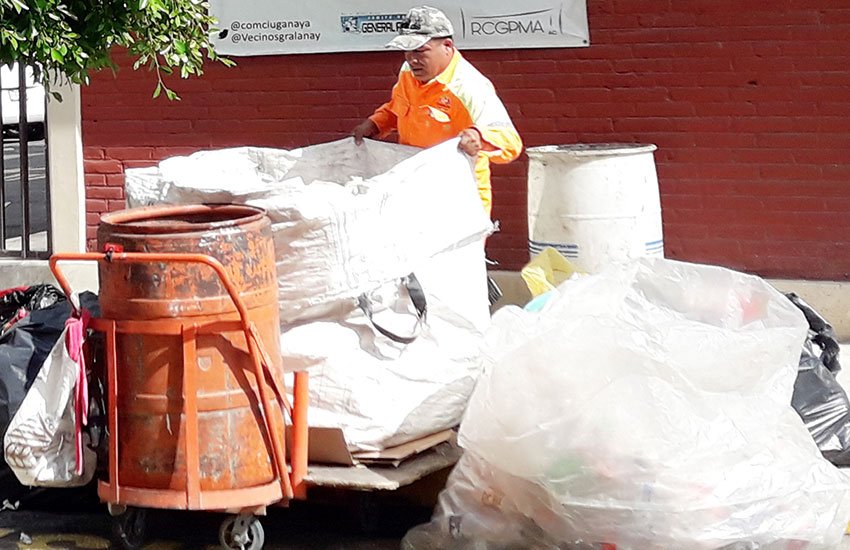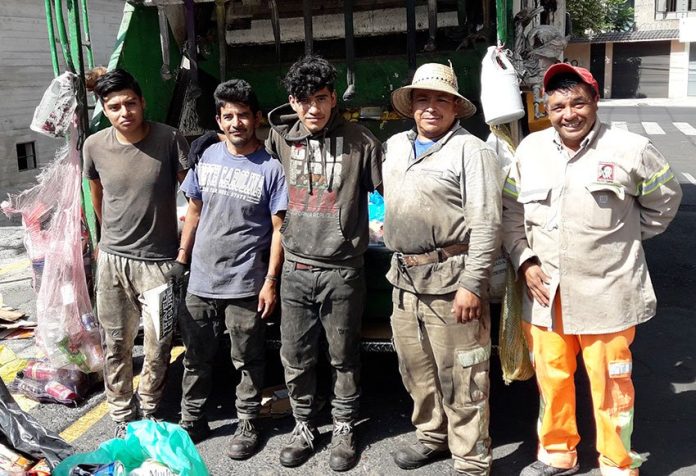Mexico City’s sanitation workers are not government employees, but volunteers, subsisting on tips and what little money they get from recycling plants after separating recyclable materials by hand.
Mexico News Daily spoke to Israel Martínez, 40, on a Saturday morning in General Anaya, Benito Juárez, as he was separating garbage. Martínez has been doing this work for 25 years.
He wears an orange reflective uniform that he bought himself: “This way, people on the street can identify you, and they trust you more,” he said.
There are many dangers in his line of work. “You can cut yourself on glass or sharp metal, or a nail might stab you in the hand. You might get hit by a car, now that everyone’s on their cell phone while they’re driving.”
He does not wear gloves or any protective equipment. “I’ve been doing this for so long that I’m used to it.”

He points out that when people separate their recyclables, his job is much easier, even if they still have a bit of liquid inside.
“I can pour out the liquid, no problem. When there are other things inside, like syringes, that makes it more difficult.” He works Monday to Saturday, starting at 7:00am, usually finishing around 4:00pm or 5:00pm. “There are no fixed hours, so it’s all about how much work you put in.”
There are many types of materials that can be recycled. “Plastic, like PET [polyethylene terephthalate], and metal goes to a processing plant in Ecatepec, in México state. Glass is sorted by color and recycled in a plant in Iztapalapa. The organic trash goes all the way to Chalco [México state]. There are four trucks a day that take it from here in Benito Juárez out to the plants.”
He explains the different materials and their separation. “Let’s say you have one of those plastic domes that a cake or pie comes in. The black base is one type of plastic, the transparent dome is PET. So those need to get separated so that the plant will accept them. A plastic Coca-Cola bottle is also PET, but the red top is a different plastic.”
On the Saturday that we spoke to him he was working alone with a wheeled cart that he uses to push around the enormous bags of garbage. During the week, he also volunteers on the garbage trucks. None of the workers on those trucks has a government salary, or a retirement package, health care or any other benefits. The government leases the truck to one person, and the rest of the workers come along to help sort the garbage in exchange for a share of the tips and payment from the plants.
Apart from paying for the gasoline, the government offers no other assistance to these essential workers.
The worst garbage, said, Martínez, are adult diapers and kitty litter. “They throw them in with everything else, and they smell awful. Also, they can make you sick.” He wishes more people would separate their recycling from their organic trash, and especially separate the dangerous and hazardous materials.
We asked Martínez if he would like to become an employee of the government. He told us that he prefers to stay independent. He also told us that he has two children, aged 11 and 14, and he would not like them to continue in their father’s footsteps. “It’s dangerous out here. I want them to finish school and look for more opportunities.” He finished secundaria (middle school) when he was 18.
On a single day. Martínez collects three giant white bags of garbage. “I’ve never weighed it, but I’d say it’s about 150 kilograms per day.” He earns between 120 and 150 pesos a day (US $6.25 to $7.80) for his efforts. When he finds anything in good condition that he can sell, he takes it to his puesto (a street market stall) in his local tianguis (a traditional Mexican flea market) in El Peñón, México state, a two and a half-hour drive from where we spoke to him.
He used to sell these items in a tianguis in Benito Juárez on Avenida Popocatépetl in Ermita, but it was recently removed by the government.
For these workers, the days are long and the work is hard. Only with the support of their community can they begin to get ahead.
The writer lives and works in Mexico City.
